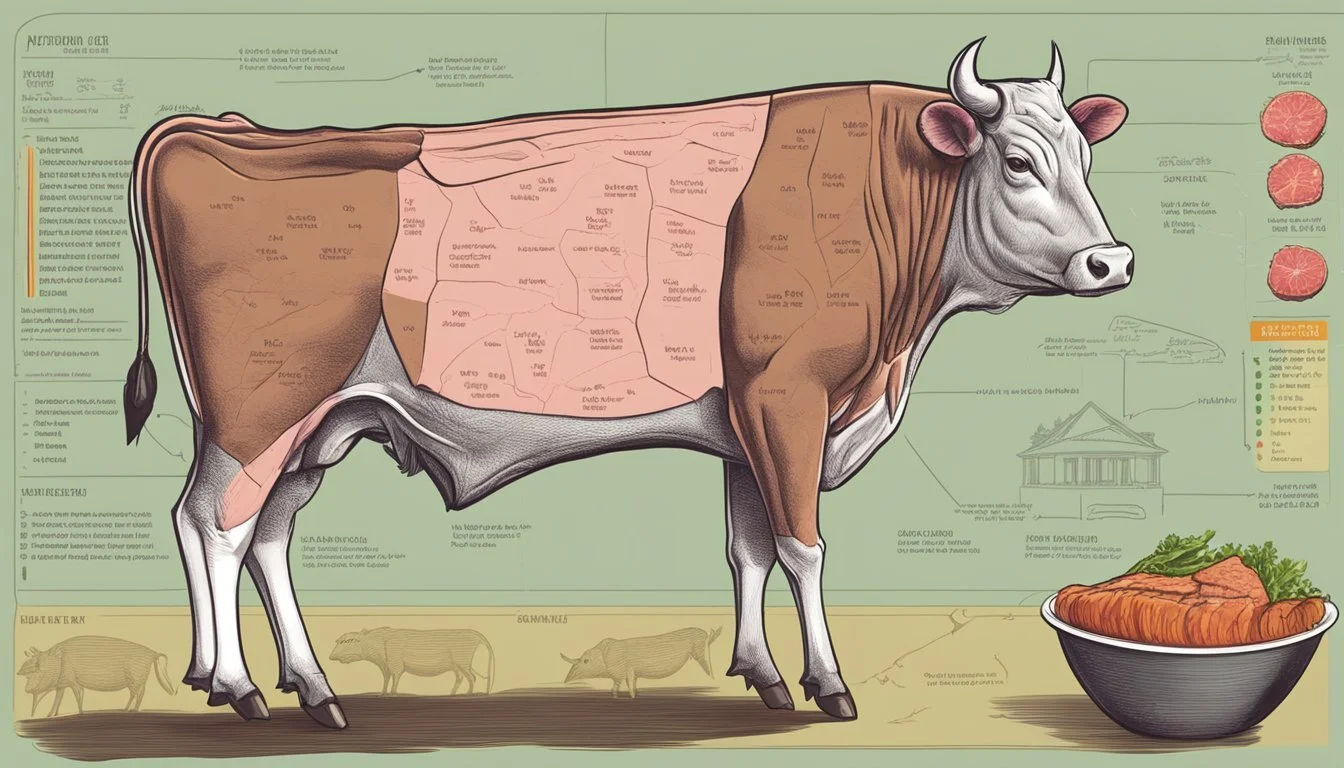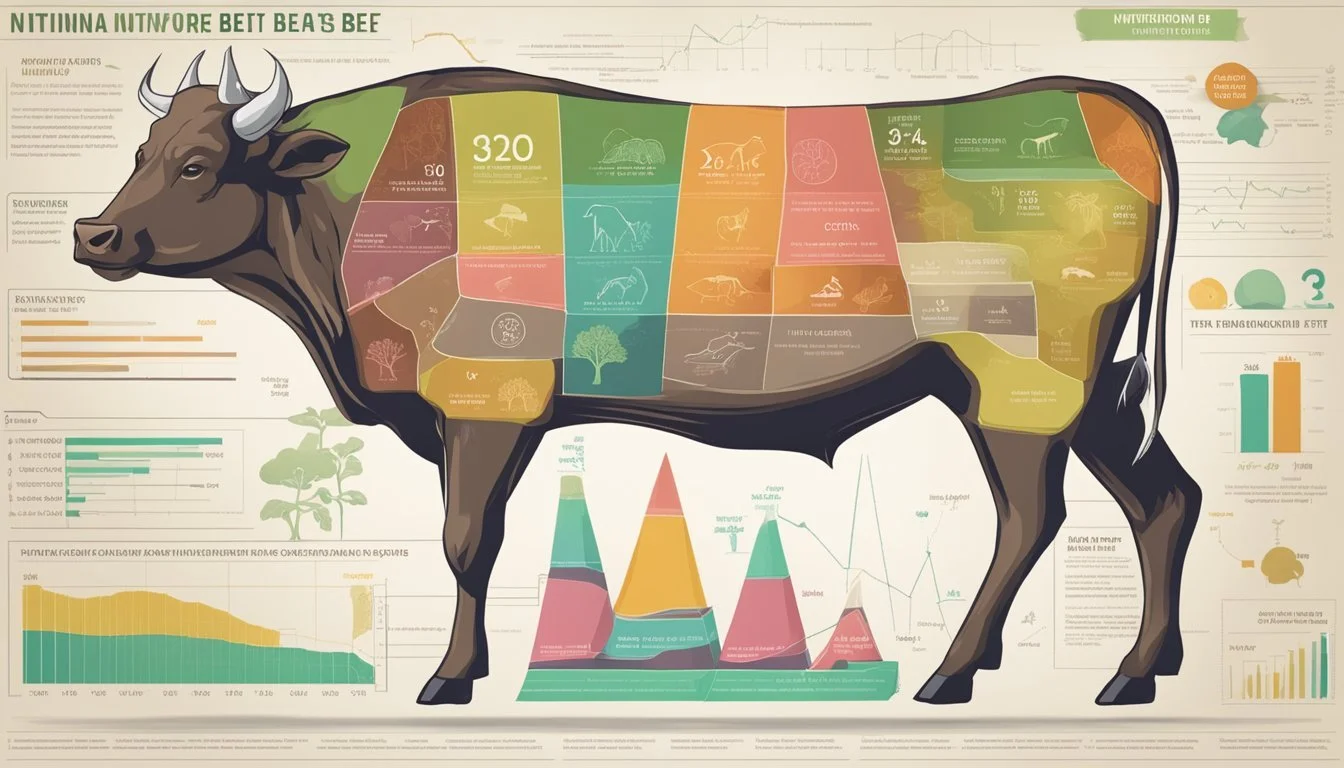Beef Nutritional Value Carnivore Diet
Key Benefits and Nutrient Profile
The carnivore diet centers around the exclusive consumption of animal products, with beef being a prominent staple due to its rich nutritional profile. For those following this diet, beef provides a significant source of essential nutrients, including high-quality protein, essential fatty acids, vitamins such as B12, and crucial minerals like iron and zinc. Beef stands out for its ability to deliver these nutrients in a highly bioavailable form, making it an optimal choice for those adhering to the carnivore diet.
When consuming beef, individuals can tailor their intake to meet specific dietary needs, whether it's ground beef for ease and convenience or prime cuts for optimal nutrition. A typical guideline suggests that individuals might consume about 1-2 pounds of beef per day to maintain sufficient caloric and nutrient intake, though this can vary based on personal requirements such as activity level or metabolic demands.
The focus on beef in the carnivore diet is not just about convenience but also about maximizing health benefits. Selecting the right cuts can enhance both flavor and nutrient density, ensuring that followers of the diet not only meet their nutritional needs efficiently but also enjoy their meals. This approach highlights the importance of understanding the nutritional value of beef and how it supports a balanced and health-focused carnivore lifestyle.
Carnivore Diet Overview
The carnivore diet centers on the consumption of animal-based foods. Supporters claim various health benefits but it raises concerns among some nutritionists.
Fundamentals of a Carnivore Diet
The carnivore diet involves eating only animal products such as meat, fish, eggs, and some dairy. Popular options include beef, pork, chicken, and seafood. All plant-based foods, including fruits, vegetables, grains, nuts, and legumes, are excluded.
This diet often leads to ketosis, where the body burns fat for energy due to the lack of carbohydrates. Meals typically consist of high-fat and high-protein options like ribeye steak, liver, and eggs prepared in butter.
Health Benefits and Risks
Health Benefits: Proponents argue that the carnivore diet may lead to weight loss, better blood sugar regulation, and improved mood. High protein intake can promote muscle growth and satiety, potentially reducing overall calorie intake.
Health Risks: Critics highlight potential risks like nutrient deficiencies due to the exclusion of plant-based foods. The diet may lack fiber, leading to digestive issues, and a high intake of saturated fats could be problematic for heart health. There's also concern about the sustainability and long-term effects of such a restrictive eating plan.
For the most extensive selection, I suggest buying fiber supplement online!
Comparison With Other Diets
Versus Keto Diet: Both the carnivore and keto diets are low-carb and can induce ketosis. However, the keto diet allows for a broader range of foods, including vegetables, nuts, and limited fruits, making it less restrictive.
Other Low-Carb Diets: Compared to general low-carb diets, the carnivore diet is more extreme, eliminating all carbohydrates. Low-carb diets like Atkins or Paleo include a mix of animal and plant foods, offering more balance and variety.
High-Protein Diets: While high in protein, other high-protein diets may include plant-based proteins, reducing dietary restrictions and offering a wider range of nutrients. The carnivore diet’s all-meat approach is unique but could be harder to maintain.
Nutritional Profile of Beef
Beef is a nutrient-dense food that plays a significant role in a carnivore diet. It offers an array of primary nutrients essential for overall health, with variations in nutritional values across different cuts. Its rich protein content makes it ideal for muscle building.
Primary Nutrients in Beef
Beef is a substantial source of protein, which is crucial for muscle repair and growth. A typical serving of beef provides around 25-30 grams of protein per 100 grams.
Fats in beef are another important component, offering both energy and essential fatty acids. Saturated fat and cholesterol levels in beef help in hormone production.
Rich in vitamins and minerals, beef includes significant amounts of iron, which is vital for oxygen transport in the blood. Additionally, beef provides vitamins B12, B6, and niacin, which are essential for energy metabolism. Zinc and selenium in beef support immune function.
Beef Cuts and Their Nutritional Differences
Different cuts of beef vary in their nutritional content. Steak, such as ribeye, tends to have higher fat content compared to lean cuts like sirloin.
Ground beef nutritional values also differ based on its fat-to-lean ratio. For instance, a 75/25 mix (lean to fat) has more fat and slightly fewer proteins than a 90/10 mix.
Organ meats, particularly beef liver, are exceptionally nutrient-dense. Liver offers high levels of vitamin A, vitamin D, and the full spectrum of B vitamins. Liver is also rich in minerals like iron and copper.
The Role of Beef in Muscle Building
Due to its high protein content, beef is ideal for those looking to increase muscle mass. The amino acids in beef proteins help repair and build muscle tissues.
Caloric density in beef also supports muscle gain, providing necessary energy for workouts. Cuts like brisket and ribeye offer more calories and fat, aiding those needing higher energy intake.
The presence of creatine in beef, a compound beneficial for muscle energy, enhances strength and performance during high-intensity activities. Including a variety of beef cuts and organ meats ensures a comprehensive intake of nutrients essential for muscle development.
Nutrient Density in Animal-Based Foods
Animal-based foods excel in providing a dense array of essential nutrients, including vitamins, minerals, proteins, and fats, which are crucial for human health. This section highlights critical aspects of nutrient density in various animal-based foods, ranging from organ meats to quality proteins and fats.
Understanding Nutrient Density
Nutrient density refers to the concentration of valuable nutrients per calorie of food. Animal-based foods like beef, lamb, pork, chicken, and turkey are particularly renowned for their high nutrient density.
For example, beef liver is exceptionally rich in vitamins A, D, and the full spectrum of B vitamins. Nutrient-dense foods support muscle growth, immune function, and overall health.
Caloric intake can be misleading without considering the nutrient density. For instance, 2000 calories of beef liver provide a different nutrient profile compared to the same calories in muscle meat. Nutrient-dense foods maximize health benefits per serving.
Organ Meats and Nutrient Content
Organ meats such as liver, kidneys, and heart are nutritional powerhouses. Beef liver, in particular, boasts an impressive array of vitamins and minerals, including high levels of vitamin A, iron, and folate.
Fish, such as sardines, mackerel, and salmon, are another excellent source of essential nutrients. They provide omega-3 fatty acids, which are vital for brain function and heart health.
Bone broth and bone marrow are rich in collagen, calcium, and other minerals, supporting joint and bone health. The inclusion of diverse organ meats and fish in the diet can prevent nutrient deficiencies, ensuring a well-rounded nutrient intake.
The Significance of Protein and Fat Quality
Quality protein and fat are critical for a carnivore diet. Meat from different sources like beef, chicken, turkey, and pork offers complete proteins, containing all essential amino acids necessary for muscle repair and growth.
Grass-fed meats and wild-caught fish often have a better nutrient profile, with higher levels of omega-3 fatty acids and lower levels of harmful substances.
Animal fats provide energy and facilitate the absorption of fat-soluble vitamins like A, D, E, and K. The combination of high-quality protein and fats enhances the overall nutrient density, making animal-based foods highly beneficial in a carnivore diet.
Non-Beef Components of a Carnivore Diet
While beef is a staple in many carnivore diets, other animal-based foods play crucial roles in ensuring a balanced and robust dietary profile. This includes a variety of meats, seafood, eggs, dairy products, and cooking fats.
Inclusion of Other Meats and Seafood
A diverse carnivore diet often includes meats such as pork, chicken, lamb, and various types of seafood. Pork provides a rich source of protein and essential fats, especially when consuming bacon or pork chops. Chicken, particularly dark meat, supplies iron and zinc. Lamb chops are not only flavorful but also high in vitamin B12 and iron.
Seafood, including salmon, tuna, sardines, herring, and shellfish like crab and oysters, offers essential fatty acids, omega-3s, and other nutrients. Regularly incorporating these foods ensures a varied nutrient intake, important for long-term dietary adherence.
Eggs and Dairy Products in the Diet
Eggs and dairy products like milk, yogurt, and cheese are significant components of a carnivore diet. Eggs are especially versatile, providing high-quality protein and fats, along with vitamins such as B12, D, and E. They can be prepared in numerous ways, making them a convenient dietary staple.
Dairy products, including hard cheeses like cheddar cheese, heavy cream, and butter, contribute to the diet's fat content and are rich in calcium and additional vitamins. Cheese offers protein and fats, while yogurt, particularly full-fat, can be a good source of probiotics and calcium. These elements add variety and essential nutrients to the diet.
The Role of Fats in Cooking and Nutrition
Fats are essential in a carnivore diet for both cooking and nutritional benefits. Lard and bacon fat are commonly used for cooking, enhancing flavor while providing necessary dietary fats. These fats are typically high in saturated and monounsaturated fats, beneficial for energy.
Butter and heavy cream serve as key fat sources, delivering richness in meals and additional vitamins like A and D. They are also essential for satiety and energy density. Proper inclusion and variation in fat sources ensure balanced nutrition and make the diet more sustainable and enjoyable.
Skip the lines and order your lard online for a stress-free shopping experience!
Potential Health Implications
Adopting a carnivore diet focuses entirely on animal-based foods which can impact various health aspects, including heart health, weight management, and inflammation.
Heart Health and Cholesterol Levels
The carnivore diet is rich in saturated fats from foods like fatty steaks, bacon, and butter. High intake of saturated fats can raise cholesterol levels, increasing the risk of developing heart disease. While some studies suggest that a high-fat diet might elevate HDL (good) cholesterol, the rise in LDL (bad) cholesterol is a concern. Elevated LDL cholesterol can lead to atherosclerosis, which may cause heart attacks or strokes.
Weight Management and Obesity
This diet often leads to weight loss due to its high protein content which promotes satiety, thereby reducing overall calorie intake. Individuals may experience faster metabolisms and a reduced appetite. However, long-term adherence to such a restrictive diet can be challenging and may lead to nutritional deficiencies if not properly managed. Consuming only animal products can limit the intake of essential nutrients found in plant-based foods, which are crucial for overall health.
Inflammation and Autoimmune Conditions
Proponents claim the carnivore diet reduces inflammation and alleviates symptoms of autoimmune conditions like arthritis. By eliminating plant-based foods that might cause inflammation, some people report reduced pain and improved arthritis symptoms. However, more research is needed to fully understand these effects. While some individuals with autoimmune diseases might benefit, this diet is not universally effective for all health issues and should be approached cautiously.
Challenges and Considerations
While the carnivore diet focused on beef has many proponents emphasizing its benefits, it's crucial to address specific challenges and considerations to ensure that followers of this diet maintain a balanced and healthy approach.
Addressing Potential Nutrient Shortfalls
A beef-centric carnivore diet may lead to potential nutrient shortfalls. Though beef is rich in protein, iron, and several B vitamins, it lacks certain minerals and vitamins like vitamin C, K, and E.
Incorporating a variety of animal foods, such as organ meats, can help mitigate these deficiencies. For example, beef liver is a potent source of vitamin A, D, and a full spectrum of B vitamins. Fish and other seafood can offer essential fatty acids and more diverse nutrients. This variety is necessary to avoid missing out on critical nutrients.
Digestive Health and Constipation
Digestive health can be a significant concern on a beef-heavy carnivore diet due to the absence of fiber, which is crucial for regular bowel movements. The lack of fiber can lead to constipation and other digestive issues.
To combat this, some recommend including organ meats like liver, which are easier to digest. Others suggest opting for fatty cuts of beef to aid digestion. Hydration is also essential, as well as consuming bone broth, which may provide some relief. Despite these measures, the absence of fiber from fruits, vegetables, grains, legumes, nuts, and seeds remains a significant challenge.
Long-Term Viability of the Diet
The restrictive nature of a carnivore diet raises concerns about its long-term viability. Eliminating entire food groups like fruits, vegetables, grains, and legumes reduces the intake of antioxidants, vitamins, and minerals essential for long-term health.
Over time, the lack of variety and essential nutrients may lead to health problems. It's also challenging to sustain due to social and practical reasons, such as eating out or attending social functions. Long-term studies on the carnivore diet are limited, making it difficult to fully understand the potential impacts on health over many years.
Addressing these challenges requires careful planning and consideration to maintain a balanced and sustainable approach to nutrition on a beef-based carnivore diet.
Adopting and Adapting to the Carnivore Diet
Embracing the carnivore diet involves focusing on animal-based foods, ensuring nutritional balance, and considering lifestyle impacts. Detailed guidance on these elements can help in successfully transitioning to this diet.
Starting a Carnivore Diet
Starting a carnivore diet centers on incorporating primarily animal-based foods.
Focus on fatty meats such as beef, lamb, and pork. Fatty cuts provide necessary energy and satiety. Other protein sources like eggs and fish are also essential. Dairy products, such as cheese and butter, can be included for fats. A typical day might start with beef steak and eggs, with meals spread throughout the day based on hunger signals. Adaptation may take time as the body shifts from carbohydrate reliance to fat-based energy.
Incorporating Variety and Balance
Balance is crucial for nutrition on a carnivore diet.
Incorporate a variety of meats to ensure a range of nutrients. For example, consume ruminant meats like beef and lamb for high-protein and micronutrients. Include fish and seafood for omega-3 fatty acids, and organ meats for vitamins and minerals. A balanced meal plan might look like this:
Breakfast: Pork sausage and cheese omelette
Lunch: Salmon with butter
Dinner: Beef liver with eggs
Diversity in food choices helps prevent nutrient deficiencies.
Lifestyle and Social Considerations
Lifestyle and social factors are significant when adopting a carnivore diet.
Adhering to this diet in social settings can be challenging. Plan meals in advance for social events, and communicate dietary needs clearly. Navigating restaurant menus involves selecting meat-based options and requesting modifications. This dietary approach often aligns with ketogenic principles, leading to improved satiety and reduced cravings. Meal planning and preparation become routine, making it easier to maintain dietary goals.
Overall, consistency and preparation aid in adapting to a carnivore lifestyle. Regularly reviewing and tweaking the diet helps align it with personal health objectives.
Controversies and Public Perception
The carnivore diet has sparked significant debate, particularly around its nutritional adequacy and broader impacts. This discussion extends to concerns over meat consumption's health implications, environmental effects, and ethical considerations, with public opinions sharply divided.
Debates Around Meat Consumption
Numerous experts, including researchers from institutions like Harvard T.H. Chan School of Public Health, argue against the carnivore diet. They cite potential nutritional deficiencies from the absence of plant-based nutrients.
Health figures such as Dr. Shawn Baker advocate for the diet, claiming it can resolve chronic ailments. Skeptics counter these claims, emphasizing the risks of high cholesterol and heart disease.
Ongoing research seeks to clarify these health impacts.
Environmental and Ethical Considerations
The environmental toll of meat-heavy diets draws significant attention. Livestock farming is a major source of greenhouse gas emissions, leading to concerns about environmental sustainability.
Ethical questions also arise about animal welfare in industrial meat production. Some suggest alternatives like plant-based diets for ethical and environmental benefits.
Public perception here is divided, with strong opinions on both sides about the moral implications of meat consumption.
Navigating Misinformation and Biases
Social media amplifies mixed messages about the carnivore diet. Influencers often share personal anecdotes rather than scientific evidence.
This contrasts with more cautious messages from health organizations promoting balanced diets. The rapid spread of diet pseudo-science and selective research interpretations fuels public confusion.
To make informed decisions, individuals need to critically evaluate sources and seek advice from accredited nutritionists and medical professionals.
Complementary Foods and Beverages
Complementary foods and beverages enhance the carnivore diet by providing additional hydration, flavor, and occasional treats.
Role of Beverages in Hydration and Nutrition
Staying hydrated is crucial on the carnivore diet. Water is the best choice for hydration, ensuring the body maintains optimal function.
Tea and coffee, consumed without sugar, offer a caffeine boost and can be integrated into daily routines. Water, unsweetened tea, and coffee are key for overall wellness.
While alcohol like wine can be consumed in moderation, it should be done sparingly to avoid disrupting ketosis.
Carnivore-Compatible Seasonings and Flavors
Simple seasonings can significantly enhance meals. Salt and pepper are fundamental, providing essential minerals and boosting flavor.
Herbs and spices such as garlic powder or rosemary may be used occasionally but in minimal amounts to stay true to the diet's principles.
Many adherents use animal fats like beef tallow or duck fat for added richness. These fats not only improve taste but also support satiety.
I always prefer buying salt, pepper, garlic powder, and tallow online because of the added convenience!
Treats and Indulgences within the Carnivore Diet
Even on a restrictive diet, it's possible to enjoy indulgent treats. Beef jerky is a popular snack, offering portability and convenience.
Pork rinds can be used for a crunchy texture, satisfying cravings for chips. Additionally, opting for high-quality sausages or cured meats provides variety and indulgence.
These treats should still adhere to the carnivorous principle, avoiding added sugars and unnecessary additives.
















